Record label / Global
House music
This issue we’ve cleared the culture pages for summer to report on media companies who are doing things on their own terms, usually against the grain, and making a success of it.
Sure, Brushfire’s a record label and does the things that a record label does – scouting for acts, being tuned into the sounds that others are signing, trying to extract the devil from the detail, doing promo, making money while wearing band tees and jeans. But the record label is also meant to be that mythical thing, the metaphorical roof over the head of its artists; have them in for a chat and know how they take their coffee, give them support and succour in a style that’s not all about ordering limos to take them to the venue but about providing a place to hang, a bosom in which to rest the weary over-toured head.
And Brushfire Records has an advantage in the bosom/head game, in the roof-over-the-artist’s-head stakes: Brushfire is actually a house. It’s a place where people come and go, drink iced tea, beer, leave the door open for the balm of the California breeze, take meetings around the family-feeling dining table, hang out.
“I grew up three blocks from here,” says Brushfire’s co-owner Emmett Malloy, “my mum’s a realtor – a real I Love Lucy type, you know? – she’d go round knocking on doors, talking to the old people, trying to figure out if they’d be dying soon; that’s kind of how this place happened!” Malloy and the gang have been in residence for six years. The residence itself was brought up from the Valley in the 1900s.
Cut in half and put on the back of two trucks. It sticks out in this neighbourhood because it’s what Malloy describes as “an old craftsman house”, it avoids the suburbia-in-excelsis of much of the Angelino architectural vernacular and because it lost its steepled roof in the move, it’s a good old flat-top. And the pitch-free top deck makes Brushfire better at fulfilling its wishes as a record label friendly to the things that it wants to be friends with and thinks we should be friends with, too: the ocean, the earth, kids, all that jazz.
And what about that? It’s easy to put Brushfire and the idea of a “good company” together. Where did that come from? It’s a lot to do with Jack Johnson, the famously chilled, campfire-guitar, surf dude from Hawaii who’s quietly sold 20 million records while being Brushfire’s main artist and the bulk of its inspiration for its synced-up, tuned-in, trailblazing attitude to protecting the surf that Johnson’s so keen on riding, living next to on Hawaii and, most famously, singing about. Johnson and Malloy go way back. Emmett and his brother made surf movies, still do, and Johnson partnered with them, providing the music which people started noticing with or without the pictures.
Away from the Mango Tree Studio, his Hawaii HQ (“a haven for messing up machinery, all that damp and sand” according to Malloy), Johnson finished his last few albums from Sleep Through the Static to the upcoming From Here To Now To You here at Brushfire’s own studio, down a flight of stairs from operations manager Ben Beverly’s office, done out with album art, a mean looking hi-fi and an elegantly wasted Chesterfield.
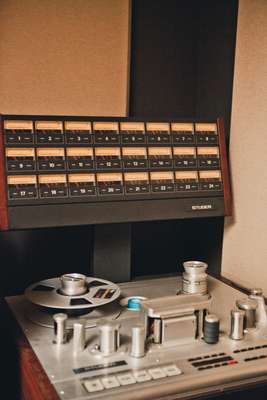

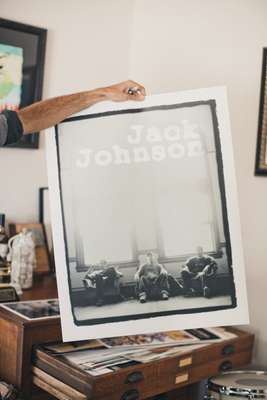
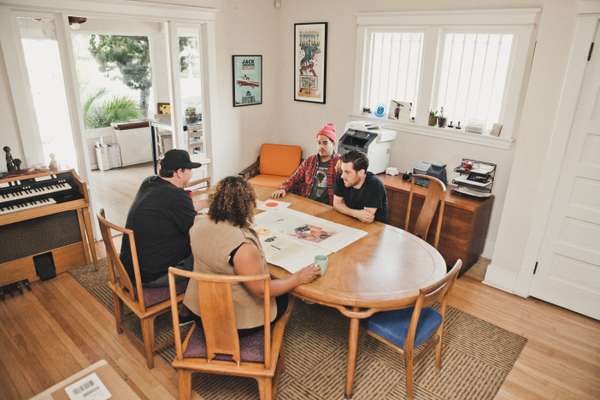
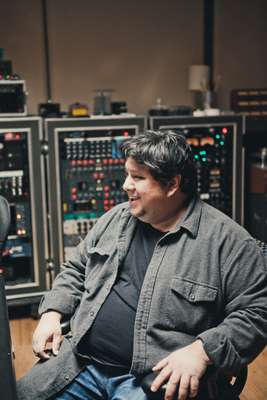

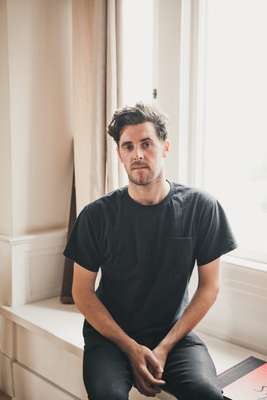

But we’re going up to the roof first, to see how that studio, christened the “Solar Powered Plastic Plant” by Brushfire’s star songwriter, got its name. Malloy’s first through the hatch and squinting into the unusually hazy LA sun. “When we started to fix this place up we wondered how to make it an emblem of our spirit; how can we set a good example?” says Malloy, hopping atop one of the farm of solar panels that deck the roof, “these things aren’t the cheap way of doing things and Jack and I had to dig deep when we started, but now it’s so obvious – even Robert, our sound engineer says the sound’s better because the electricity’s coming from a better place, a purer feed.” Well, that settles it.
The view’s cool, too. That sexy LA mix. Blue skies, the toffee-crumble Hollywood Hills up north (oh, look – there’s the sign), downtown’s shimmering skyscrapers southwest, the swaying palms and surprisingly superabundant verdure in this neat, tidy and definitively fifties-feeling residential neighbourhood.
“We always wanted it to feel homemade, not just the house – we’re spirited by that, sonically, and we wanted the relationships between the bands and ourselves to be honest and have some depth,” says Malloy. Downstairs, continuing the tour on the sun-drenched upper floor of the house is an exercise in catching the vibe of the label.
It shows off the habits, passions and inspirations of Malloy and his brother, hip to the world of surf movies and the world of commercials, music videos and documentaries for their main man Jack, for the White Stripes and for Hollywood royalty, too. A self-commissioned, self-consciously gauche framed pencil sketch of Will Ferrell, peeping inanely from beneath a “WILL” trucker cap is dedicated “to my main homies, go suck it!” Next to it is a Grammy, some shots of Jack White bowling on a tour of Canada a few years back, a drum kit made from surfboard fibreglass, vintage furniture, a record player on which spins the new record from Kurt Vile, swapped to listen to some tracks from the new Jack Johnson record on Malloy’s computer.
It’s an uncanny thing, hearing these as-yet-unreleased tracks at Brushfire’s mothership, Johnson’s familiar vocals, the acoustic guitar as warm as sunbaked beach sand, the production so simple and stripped back that it’s almost an anti-trademark. It suits the place, that sound. Homemade but internationally successful. Clever, huh?
Back downstairs, we’re stepping through the kitchen that’s as homey as a Rockwell backdrop but done in renewable, recycled and environmentally responsible materials. And with a musician’s and surfer’s twist – the Jaws poster over the sink features a madly-paddling guy on a board, a Hawaiian trophy sits on a dresser.
The kitchen caters for Brushfire’s bands and parties, too. But surely this was the town that take-out was made for? “In LA, you get killed by the whole ‘yeah, it’s five minutes round the corner thing’,” says Malloy, “and half an hour later you’re still in your car looking for a place to U-turn.”
Growing up nearby, Malloy knows the drill, the restaurants, bodegas, the layout. “Recording’s all about short productive bursts, on a practical level you need to know where stuff is, you can’t have bands wandering the streets looking for tacos.” It’s a good point that highlights one of Brushfire’s other assets neatly.
Down in the studio, Johnson and Ben Harper have just been jamming, putting together a track for the new record. Asking around the building, the consensus is that “they killed it!”, a burst of productivity indeed. But what about the pace of this place? Is it possible to be so chilled you don’t get anything done? Don’t be fooled. “It’s a great work spot, it’s nice to have somewhere this comfortable to work but we’re as productive as shit, we get busy in here, you know?”
Despite the adjective, the studio smells great. It must be those refinished hardwood floors, the static fuzzing from those warmed-up vintage amps, the Persian rugs and veneer on the baffles and slats that allow sunshine from the rooflights to fall just so when the studio’s being used (monocle’s photographer appreciated the effect, look at the shots).
The studio’s been used by all sorts of bands, it’s frequented by those that don’t quite share the laid-back attitude that seems to pervade Brushfire (although when have studios been famous for stress other than the apocryphal tales of Phil Spector’s paranoid excesses?
Through its business model (Johnson’s touring profits go to ocean charities), renewable and reclaimed materials and low-energy lighting (the only bulbs of the sort I’ve seen that give a lovely, low lamplight, too) the studio lives up to Johnson’s commitment to protecting the seas he surfs in. The label is “defined by Jack, that’s what it is,” according to Malloy. It also seems genuinely artist-friendly, they do 50:50 deals, that of which many speak but rarely are borne out in checks and balances at the end of the artist’s financial year.
Brushfire’s a good place, it’s a good company with a headquarters that many mistake for a house in which the studio staff and the label family live rather than work, which must be a good sign of the vibe that pervades the place. Malloy himself has a filmmaker’s eye for detail and a surfer’s eye for catching a wave; and knows he’s ridden this one with style and that it’s a pipe that’s rolling along beautifully while the swell’s still bubbling nicely out from the shoreline.


